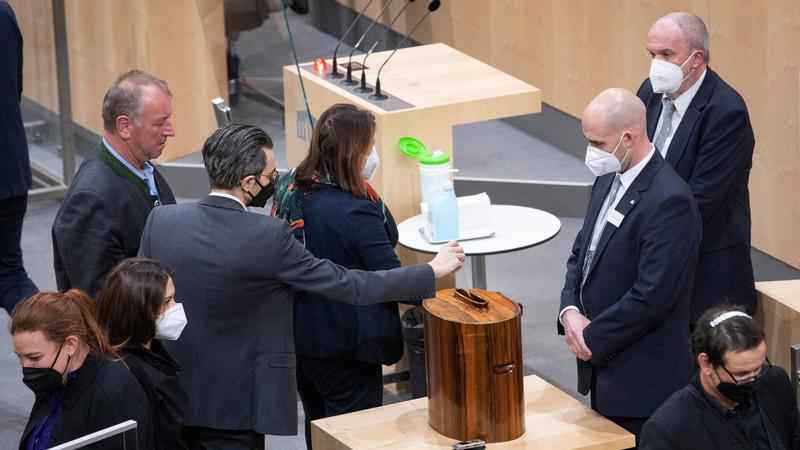Austrian parliament approves vaccine mandate for adults

Lawmakers vote on compulsory COVID-19 vaccination in the parliament in Vienna, Austria, Thursday, Jan. 20, 2022.[AP Photo/Lisa Leutner]
Austria’s parliament voted Thursday to introduce a COVID-19 vaccine mandate for adults from Feb. 1, the first of its kind in Europe.
Lawmakers voted 137 to 33 in favor of the mandate, which will apply to all residents of Austria aged 18 and over. Exemptions are made for pregnant women, people who for medical reasons can’t be vaccinated, or who have recovered from a coronavirus infection in the past six months.
Officials say the mandate is necessary because vaccination rates remain too low in the small Alpine country.
Health Minister Wolfgang Mueckstein, speaking in parliament Thursday afternoon, called the measure a "big, and, for the first time, also lasting step" in Austria’s fight against the pandemic.
"This is how we can manage to escape the cycle of opening and closing, of lockdowns," he said, noting that it’s about fighting not just omicron, but any future variants that might emerge. "That is why this law is so urgently needed right now."
The Austrian government first announced the plan for a universal vaccine mandate at the same time it imposed a since-lifted lockdown in November, and amid concern that Austria’s vaccination rate was comparatively low for Western Europe. As of Wednesday, 71.8% of the population of 8.9 million was considered fully vaccinated.
Chancellor Karl Nehammer’s governing coalition worked with two of the three opposition parties in parliament on the plan to implement the mandate. It calls for the vaccine mandate to go into effect at the beginning of February, but enforcement will start in March.
To start with, authorities will write to every household to inform them of the new rules.
From mid-March, police will start checking people’s vaccination status during routine checks; people who can’t produce proof of vaccination will be asked in writing to do so and will be fined up to 600 euros ($685) if they don’t.
If authorities judge the country’s vaccination progress still to be insufficient, Nehammer said they would then send reminders to people who remain unvaccinated. If that still doesn’t work, people would be sent a vaccination appointment and fined if they don’t keep it. Officials hope they won’t need to use the last measure. Fines could reach 3,600 euros if people contest their punishment and full proceedings are opened.
The mandate is supposed to remain in place until the end of January 2024. An expert commission will report to the government and parliament every three months on vaccination progress.
The government originally intended for the mandate to apply to all residents 14 and over, but changed that to 18 during consultations with political opponents and others.
Some other European countries have introduced vaccine mandates for specific professional or age groups. Neighboring Germany is considering a mandate for all, but it’s not yet clear whether, when and in what form that will go ahead.